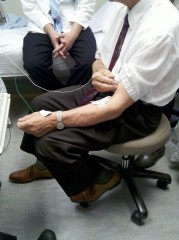“Overnight, Mrs. Blake had 650 cc of emesis,” I reported to my senior resident.
“So what do you wanna do about it,” he asked me.
Unprepared for the question, I paused. I was expecting him to tell me what he wanted to do about it. I’m still trying to get used to this whole 3rd-year-medical-student-thing.
As I continue in my training, I have to transition from someone who collects data to someone who interprets data and comes up with a plan for what to do next. Anyone can collect data. But I’m going to be a doctor. At least that’s what my senior resident said to me.
Fine. I have to learn to do something about the data I collect. It’s tough, though. I don’t want to do something wrong. It’s comfortable to “just” collect data without having to do something with it.
I suppose it is fitting, then, that the last two years of medical school revolve around the question of “what is the next step in management?” This is in contrast to the emphasis in the first two years where the question that haunts medical students is “what is the diagnosis?”
Change is hard. But change, I must.





